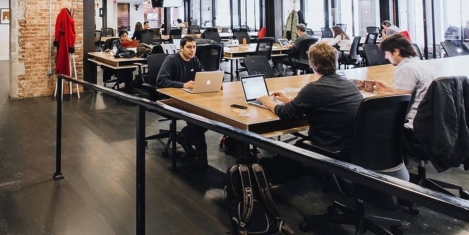June 7, 2018
Over half of employees say remote working and coworking increase their productivity
 More than half of US based employees (54 percent) with the chance to work remotely say they are most productive when they work outside a traditional office environment, such as at home, in a coffee shop, or in a coworking space, according to a new survey by research firm Clutch. Over two-thirds (68 percent) of workers surveyed work in a traditional office. However, higher productivity isn’t the only reason employees prefer other workspace options. Over a quarter (26 percent) of employees who have some degree of flexibility say a better work-life balance is the top benefit of working outside the office. Other benefits include flexible work hours (21 percent) and fewer distractions (18 percent).
More than half of US based employees (54 percent) with the chance to work remotely say they are most productive when they work outside a traditional office environment, such as at home, in a coffee shop, or in a coworking space, according to a new survey by research firm Clutch. Over two-thirds (68 percent) of workers surveyed work in a traditional office. However, higher productivity isn’t the only reason employees prefer other workspace options. Over a quarter (26 percent) of employees who have some degree of flexibility say a better work-life balance is the top benefit of working outside the office. Other benefits include flexible work hours (21 percent) and fewer distractions (18 percent).









 UK office workers spend an alarmingly limited amount of time outdoors each day, claims new research from Ambius, which found that almost 40 percent spend a maximum of just 15 minutes outside, excluding their commute to work, and an additional 22 percent spend a maximum of 30 minutes outside. This is even less than prisoners, who require ‘at least one hour of suitable exercise in the open air daily’, according to UN guidelines. On average, the British workers surveyed spend more time per day at their desk or workstation (6.8 hours) than they do in bed (6.4 hours), relaxing at home (3.5 hours) or outdoors (37 mins). A lack of fresh air (57 percent), insufficient natural light (49 percent), and an absence of indoor plants (36 percent) were the biggest source of frustration for employees. Introducing indoor plants (49 percent), nicer artwork (50 percent), and a more interesting colour scheme (54 percent), topped the list of employees’ requests to improve their workplace.
UK office workers spend an alarmingly limited amount of time outdoors each day, claims new research from Ambius, which found that almost 40 percent spend a maximum of just 15 minutes outside, excluding their commute to work, and an additional 22 percent spend a maximum of 30 minutes outside. This is even less than prisoners, who require ‘at least one hour of suitable exercise in the open air daily’, according to UN guidelines. On average, the British workers surveyed spend more time per day at their desk or workstation (6.8 hours) than they do in bed (6.4 hours), relaxing at home (3.5 hours) or outdoors (37 mins). A lack of fresh air (57 percent), insufficient natural light (49 percent), and an absence of indoor plants (36 percent) were the biggest source of frustration for employees. Introducing indoor plants (49 percent), nicer artwork (50 percent), and a more interesting colour scheme (54 percent), topped the list of employees’ requests to improve their workplace.










 In a workplace dominated by insecurity, gig work and intelligent machines we need to improve our understanding of their potential impact on health, safety and wellbeing claims a new report.
In a workplace dominated by insecurity, gig work and intelligent machines we need to improve our understanding of their potential impact on health, safety and wellbeing claims a new report. 
 A third of workers (32 percent) regularly struggle to be productive in their job, and one in six (16 percent) blame their manager – claims a new survey from ADP. This puts bad management ahead of inefficient systems and processes (15 percent) and staff shortages (13 percent) as the biggest drain on productivity in the UK workplace. The UK has been grappling with low productivity levels for a number of years, consistently placed behind other leading economies, such as Germany and the US in official productivity tables. While recent ONS figures suggested a recovery is underway, reporting
A third of workers (32 percent) regularly struggle to be productive in their job, and one in six (16 percent) blame their manager – claims a new survey from ADP. This puts bad management ahead of inefficient systems and processes (15 percent) and staff shortages (13 percent) as the biggest drain on productivity in the UK workplace. The UK has been grappling with low productivity levels for a number of years, consistently placed behind other leading economies, such as Germany and the US in official productivity tables. While recent ONS figures suggested a recovery is underway, reporting 









June 13, 2018
US companies are waking up to the benefits of caring for employee mental health
by Colleen O'Day • Comment, Wellbeing
More →